Paul Kent: Canterbury Bulldogs’ fate rests on shoulders of Phil Gould
The Bulldogs took a tremendous leap of faith in signing Phil Gould to a long-term contract as football boss, now the future of the club is in his hands, writes PAUL KENT.
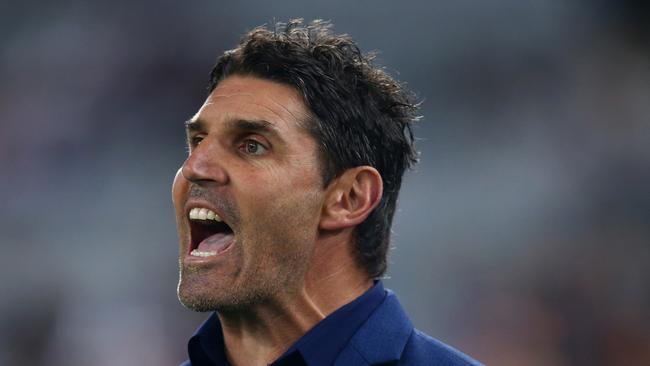
NRL
Don't miss out on the headlines from NRL. Followed categories will be added to My News.
The speed that clubs recover from rock bottom, where Canterbury boss Phil Gould declared the Bulldogs were uncomfortably resting on Monday, depends almost exclusively on the quality of their decisions from that moment on.
The Bulldogs have taken five miserable years to get to where they are now, last and falling, with just eight wins in the past two and a half seasons.
Everybody knows the club needs to change, it’s just that not everyone can agree on how.
Watch every game of Magic Round this weekend Live & Ad-Break Free In Play on Kayo. New to Kayo? Try 14-Days Free Now >
It proves an old truth in the game, which proves how hard change can be.
The hardest decision for the decision makers involved, it goes, is to admit they might have to change the decision makers.
Nobody ever sees themselves as part of the problem.
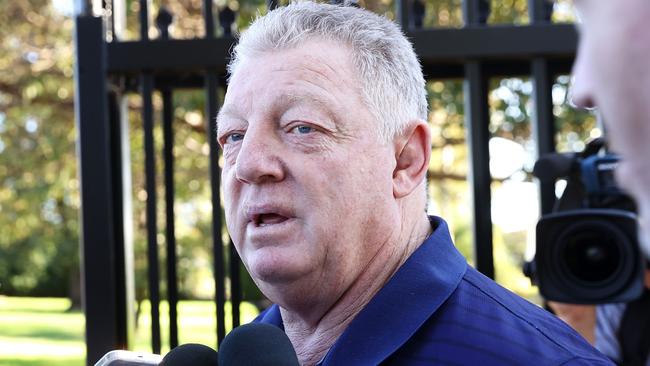
That was why Trent Barrett was moved on Monday when, despite the push that Barrett resigned, it was made clear to Barrett that the decision had been made for him.
With Viliame Kikau and Reed Mahoney arriving next season and a salary cap wide open in 2024, Barrett saw blue skies ahead.
He would make a fine weatherman.
Then, on Tuesday, Brent Naden and high performance manager Dan Ferris followed Barrett out the door. Jack Hetherington could be next.
All Blacks coach Steve Hansen has been helping the club as a consultant, but might not be welcomed back after blasting board members who “get twitchy’’ when things aren’t going right.
Part of the problem at the Bulldogs in the past five years is the board is changing more rapidly than the playing roster, and even the coach, meaning nobody is ever accountable.
By the time it is realised that the board or football department have made a mistake, they are generally long gone and somebody else has inherited the mess.
That was part of the reason the Bulldogs signed Gould to a healthy long-term contract.
Gould wanted to insure himself against club politics with a tenure that went beyond election terms and the club, seeing the sense in this, acknowledged it by signing him to a long-term deal that extended beyond electoral terms.
Which has basically put the club’s future in Gould’s hands.
He can’t be sacked, for starters, because the payout is too big.
It is a tremendous leap of faith, and one the club is now firmly attached to.
That Gould is the true boss is a realisation that just dawned major sponsor Arthur Laundy, who is feeling increasingly slighted at the club despite being the one who stumps up the money.
Outside of Gould, there are few anywhere else in the club with the footy IQ to rebuild the Bulldogs.
Chairman John Khoury is honest and a hard worker but is naive when it comes to football operations and still highly reactive to boardroom politics, so much so he recently told members that if they had a concern for the club they should call him.
Here’s my number …
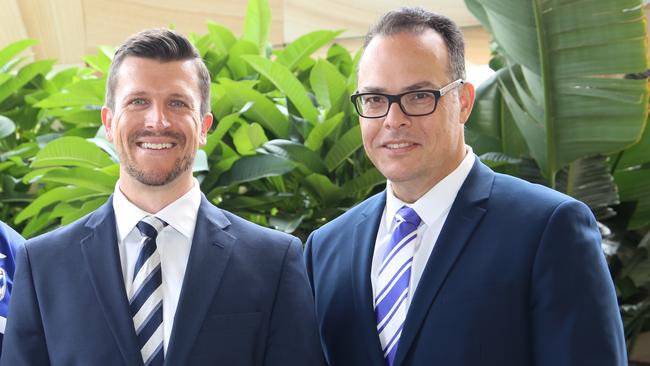
It must be the only club where members are on a first-call basis with the boss.
Board members Peter McMahon, Joe Thomas and Peter Mortimer are proven performers. Andrew Gifford is intelligent and educated and a strong ally.
The rest are fanboys, triers, but without the experience to get it done.
Is it any wonder the club has lost its identity.
There was a time when the Bulldogs brand was the benchmark.
In the 35 seasons between 1979 and 2014, the Bulldogs made 12 grand finals, for six premierships. Success became an expectation at the club, and because nobody did it better, the club recruited almost exclusively from within.
Talking on Monday night, Gould said he recommended against Barrett taking the Canterbury job because he was not a former Bulldog.
“When he went to Manly I said you’re not a Manly boy, they won’t protect you, and the same thing with the Bulldogs, you’re not a Bulldogs boy, you’re a Dragon,” he said.
“If things are going bad there’s going to be no one there to protect you, and that’s pretty much how it panned out.”
Barrett believed Gould was there, to protect him, but it did not turn out that way.
The problem with Gould’s analogy was that Dean Pay, who Barrett replaced, was a Bulldogs boy. Yet Pay was given little chance.
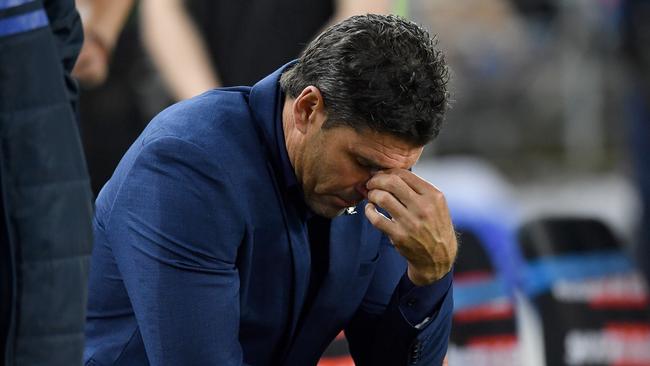
He inherited a roster gutted by salary cap failings and was told he was unable to recruit any blue chip talent.
Pay walked onto the field one morning as his team warmed up for a field session and, after a slow look over the squad, turned to assistant coach Steve Antonelli.
“We’ve basically got two reserve grade teams,” he said.
The club had no intention to help him, saving it for when the cap problem was fixed, last year. By then Barrett was in the job, and despite the lock on the safe being opened, the Dogs failed to arrest their problems.
Again, Gould said the recruitment was driven by “urgency and desperation” rather than any real plan.
And so it comes to this.
In a purgatory of their own making the hopes of the club remain Gould, who at Penrith showed he could rebuild a club almost all the way to the top, but who lately flutters on delicate wings.
Gould’s ugly history of coach hypocrisy
The only true surprise in the whole sad downfall came Sunday night after Trent Barrett bought himself a beer at the Settler’s Inn at Port Macquarie and was heading back to a table.
Barrett was in town for a funeral, so the mood was sombre enough already, and as he walked back to his table an upward glance at the television brought the breaking news on Fox Sports that the Canterbury board had called an emergency meeting for Monday to discuss his future.
As news goes, it wasn’t good.
Barrett immediately went to his phone.
And while the decision for Barrett to leave the Bulldogs might have been a surprise for some, the true surprise for Barrett’s departure is only the timing remained.
Barrett was in several meetings over the weekend in Brisbane with the Bulldogs head of football, Phil Gould, after they crashed to Newcastle on Friday.
From those meetings the Bulldogs’ board called a meeting to discuss his future.
Or perhaps they didn’t.

Some are writing hard that the decision to move Barrett on was taken out of Gould’s hands, which would suggest it had nothing to do with the Brisbane meetings at all, but the decision for Barrett to move on happened before the board meeting and, at the very least, has emerged as tremendous coincidence.
Now, this being rugby league, the narrative is more often about who, rather than what, to believe.
Just two weeks ago Gould, on television, declared that Barrett would be at the club “long after I’m gone”.
This was offered as a show of support, it seems, and lasted about a fortnight.
But it also came just a few weeks after news broke that Gould had taken over a team review and then continued the day coaching the team on the field.
From a casual observer’s point of view, Gould’s intervention was a continuation of a habit that has happened at previous clubs and each time ended in the coaching leaving before his contract was done.
Graham Murray, Ricky Stuart, Ivan Cleary, Anthony Griffin …
I said on NRL360 at the time it was the end of Barrett at the club. That the noise in the background was the beginning of Barrett’s funeral march.
Gould tried to claim there was an agenda. That, for reasons he wasn’t clear, certain people in the media had an agenda. Although about what he did not disclose.
Once again, it is a clever piece of revisionist history from Gould.
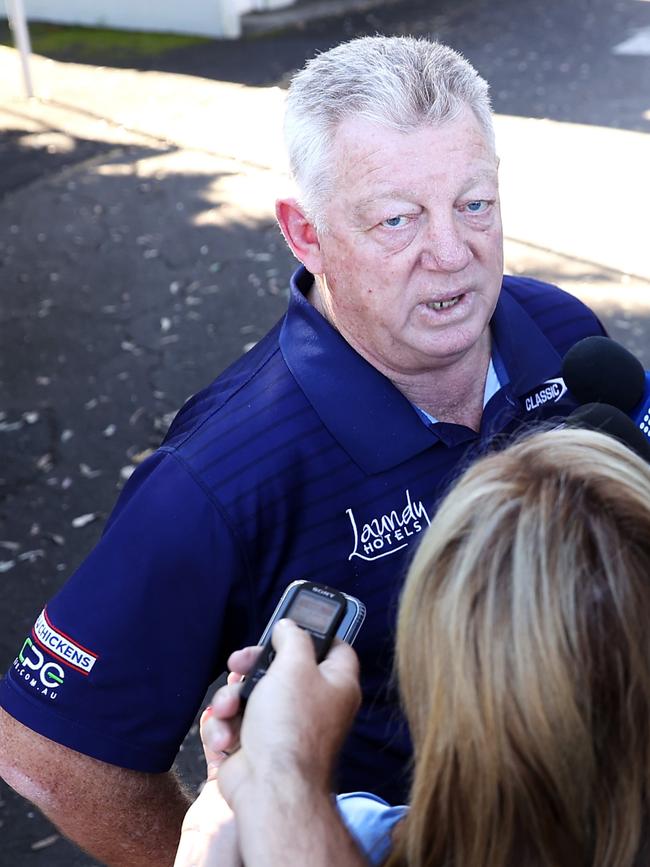
Barrett has the second worst coaching record in the 87-year history of the club, the worst being their inaugural season in 1935.
Their attack over the first 10 rounds is the worst since the South Queensland Crushers in 1996.
They sit last on the ladder.
Clearly, the commentary around the club was about results, not agendas.
Gould is smart enough to recognise this and also that, despite an off-season where they went hard into the player market, buying more who was available than what they needed, the club has failed to improve as expected.
Whatever the semantics, Barrett’s job was gone that moment four weeks back when, according to Gould, he tossed his whistle to Gould and told him to take over the coaching session, claiming the players needed to hear a different voice.
Whether it was Barrett’s or Gould’s idea, it said either the coach wasn’t reaching them or the information he was hitting them with was irrelevant.
When the Bulldogs beat the Roosters that weekend it reinforced concerns there were deeper issues.
Barrett was an inexperienced coach at a club with an inexperienced chief executive, an inexperienced chairman and with half a board who know what they are doing while the other half get giggly about getting into the dressing room after a game.
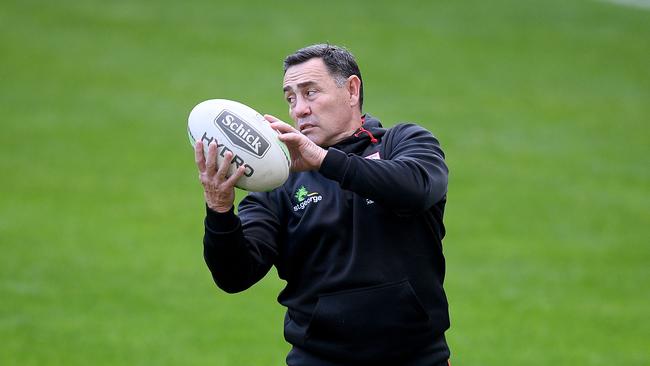
When Steve Price was pushed out as the head of football the club initially believed they could manage it on their own until the size of the job became evident.
Gould was eventually hired after former Cowboys head of football Peter Parr, Storm head of football Frank Ponissi and former Newcastle coach Michael Hagan all knocked back approaches for the job.
Gould brought the experience that was needed but sometimes can’t help himself and gets too involved.
So the trick now is to find a coach, qualified enough to start the Bulldogs moving up the ladder, who can tolerate the coaching interference that Gould finds irresistible to fight off.
Gould, it goes, met with Shane Flanagan in Wollongong before Gould travelled to Brisbane for Magic Round.
Maybe it was to talk about son Kyle …
Penrith assistant Cameron Ciraldo, the man many believe is the next coach in waiting, has privately said he is not interested in the head coaching job at Canterbury.
Gould is still looking for a dance partner.
He is Astaire without Rogers, the last man standing when the nightclub lights come on.
Peter Moore used to say success was in the woodwork at Canterbury. Now, sadly, the termites have taken over.





